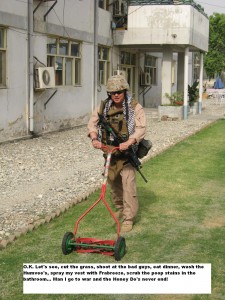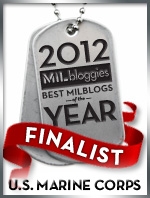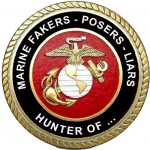Missing the big picture
January 6th, 2007 Posted in The SandGram v1.0Before I continue with my Corpus Christi Saga, I have to put a plug in for a great American and his name is Cpl Matt Sanchez USMCR. I’m very impressed with this guy and hope that one day he has the chance to run for office. I Know that you will enjoy his style of writing as much as I have. Please go check out his blog for some clips of him on the O’Reilly Factor and Hannity and Colmes. I had the honor of chatting with him via Email, and can tell you that he is the real deal. Where do the Marines find such Outstanding young men?? He and the thousands of others that are signing up everyday make me proud to say that I’m a Marine and American!!
Semper Fi,
Taco
www.mattsanchez.blogspot.com
Missing the big picture
Ivy League protesters feel superior to service members
By Matt Sanchez
The Columbia University Activities Day was the first week of school in 2005, with eager students lingering by a group of tables, deciding which activities to sign up for.
I was talking with friends when a group of student socialists gathered in mass and started to yell, “Get off our campus!”
“The military exploits minorities!” they chanted in a frenzy. It does?
“Hey,” I replied. I used my college voice, that sensitive, interested-in-debate tone that’s supposed to be passable at an Ivy League school. “I’m a minority; I joined the military, and I don’t think I’m being e One protester’s face flared red, like a pale recruit after two minutes on the quarterdeck.
“That’s because you’re stupid — too stupid to realize you’re being used as cannon fodder.”
I took the high road, leaving the table to report the group’s conduct to the university administration. This was not the first time such a confrontation had happened, but I wanted it to be the last.
It wasn’t the insults that bothered me: Shouts of “baby killer,” “murderer” and “Nazi” didn’t compare to the extreme stress and conflict I felt during boot camp. We all stepped on the yellow footprints in the middle of the night, completely disoriented. After the fourth day of sleep deprivation and fatigue, I knew I wasn’t going to quit, but it sure looked like the guy next to me was, and he may have been thinking the same thing about me.
What disturbed me was the odd disconnect between Columbia University, an elite institution of higher learning, and the Marine Corps, an elite branch of the military. Just that summer, a young sophomore asked, “You’re a Marine and you learn how to kill, so what makes you any different than the terrorists who flew the planes into the Twin Towers on 9/11?”
The group I had offended was not as inquisitive; they just wanted a poster boy. So they printed a flier of me next to a dead Iraqi kid and a homeless veteran and wrote “Victim?” next to it. In the morning, they handed the fliers to students as they entered the campus for a new day of learning.
I’m not a whiner. I never once raised my hand for sick call. I didn’t complain when, one calm Sunday afternoon, the drill instructors tore apart the barracks right after we had finished cleaning them. I didn’t say a word when, during the Crucible, a careless recruit dropped a cement-filled bucket on my head.
So why did a bunch of privileged brats calling me cannon fodder for joining the Marine Corps bother me so much? I could speak of racial injustice, breaking group and student conduct rules, or harassment, but that wouldn’t be the entire story. When I’m completely honest with myself, I understand the real reason this episode made my blood boil.
Deep down inside, most of the people at sophisticated, exclusive Columbia University felt they were superior to the military, and particularly the Corps. Honor, courage and commitment? Any undergrad and most of the faculty would tell you, in a double-spaced six-page essay, that these things are relative — impossible to define. For the academics, joining the Corps over attending an Ivy League school was an obvious sign of desperation.
Were we desperate? Our platoon “heavy hat,” Staff Sgt. Forde, never once mentioned he was named the best tanker in the Corps — two years in a row. But my professors at Columbia always mention the books they and their colleagues have written and often assign those books, as graded papers, so we all have to mention them, too. Who is desperate?
I joined the Corps not because I couldn’t make it elsewhere or because I needed money to go to school. No signing bonus was going to turn me into a soldier. I became a Marine because I wanted to be among the best, just as I applied to Columbia because I wanted to be among the brightest. I knew both required a high price.
Why not go elsewhere? Because we were different before we joined the Corps. We knew it was going to be tough, more intense, but we still joined instead of taking an easier way. We made it through boot camp and even reported for duty after they gave us our first 10 days of leave. We all got in for different reasons, but the Corps trained us, honing our skills so that we’d attack on command and fight to win. For the few, the eagle, globe and anchor is not just a popular window sticker, it also means we stand for something.
Like rapid fire at the 200-yard line, the flurry of action after the incident was quick and easy to lose track of. I went from one administrator to the next, confident I would eventually find someone to help. I met many people who emphasized how much “we really appreciate our veteran community.” But like patched up “D” targets, they all looked the same — compassionate and concerned — and said the same thing — “This was an outrage.”
Months passed, and the administration dismissed the complaint, with no appeal. According to the student newspaper, the Columbia Spectator, two of the students “were brought in for hearings in November and were later told that the administration did not hold them responsible.”
I became more determined. Sometimes, firing from the farthest line is where you take the best, most meditated shot. I settled in, drew my breath and aimed. If Columbia was not downrange, the media was in plain sight.
I went on national television, debating free speech on campus vs. anti-military sentiment. “What do you want out of this?” asked the commentator. “What do you expect Columbia University to do?” he asked, smirking.
What do I expect? How about saving veterans thousands of dollars by giving a lousy physical education credit for going through boot camp? It’s at least as tough as running after a birdie for an hour on the polished wooden basketball court.
How about a university Veterans Affairs representative who can deal with a Marine’s mistaken tuition charges when he’s deployed overseas? How about dropping the “we appreciate our veterans community” line and provoking a serious dialogue on campus, because if an Ivy League student cannot understand the difference between the commandant of the Marine Corps and Osama bin Laden, higher education has sunk pretty low.
So why do we do it? Why do I do it? I’m doing this for Lance Cpl. Lam, who used to call me “Super Sanchez” in the shop before he deployed and was killed in Iraq.
I’m doing it for the literally hundreds of veterans who e-mailed after I wrote an op-ed piece in The New York Post and appeared on national television to tell me similar stories of double standards for veterans, and the hundreds more who thought of writing me but just figured it wouldn’t matter.
I’m doing it for Lt. Bayer, a Columbia graduate, who died in the World War II Battle of Peleliu and whose plaque in the university gym often goes unnoticed by students who have not acquired the skills to connect his bravery and sacrifice with the everyday freedom they have to assemble, protest and, yes, pass out fliers.
I’m doing it because I know the Marine Corps has
a special, personal intelligence that goes far beyond book smarts and high above street smarts.
I’m writing this because you should know that I go to school with the people who literally write history books and — whether we like it or not — the way the Marine Corps is portrayed depends almost as much on them as it does on us.
Editor’s note: Columbia University issued this statement when asked for a response: “Columbia University conducted a thorough investigation of the charges Mr. Sanchez made against other students in 2005 for insensitive remarks.” The school declined to discuss its findings, citing privacy laws.
The writer, a corporal in the Marine Corps Reserve, is a junior at Columbia University. He can be reached at matthew.a.sanchez@gmail.com.
Tags: The SandGram v1.0





